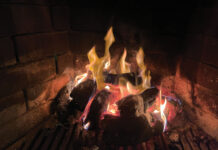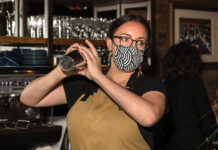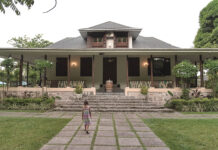In early 2021, Aimsir Distilling Co. in Portland, Oregon, had only been open since the previous December and COVID restrictions were finally scaling back. “We were talking about things we could do in the bar for St. Patrick’s Day now that we could seat some people inside,” says Steve Hopkins, who co-owns the distillery with his wife, Christine Hopkins. “We wanted to make it a special night and we thought about Irish Coffees, and being a producer we realized that we could put much of what goes into that drink together ourselves in a bottle.”
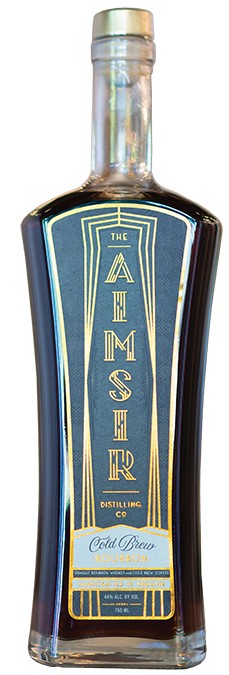 Inspired, Steve sourced cold brew coffee from local roaster Junior’s Roasted Coffee and used that to proof down straight bourbon whiskey. The result was Aimsir Cold Brew Bourbon, and it was an instant hit. “The first night I made a batch, I took it out to the bar to get some customer feedback and people wanted to buy it that night,” he says. “Sadly, I didn’t have any to sell them, but we immediately went through the work of getting COLA approved.” Since officially debuting in April 2021, Aimsir Cold Brew Bourbon has won several awards, including a Best of Category for Flavored Whiskey from the American Distilling Institute’s 2022 International Spirits Competition.
Inspired, Steve sourced cold brew coffee from local roaster Junior’s Roasted Coffee and used that to proof down straight bourbon whiskey. The result was Aimsir Cold Brew Bourbon, and it was an instant hit. “The first night I made a batch, I took it out to the bar to get some customer feedback and people wanted to buy it that night,” he says. “Sadly, I didn’t have any to sell them, but we immediately went through the work of getting COLA approved.” Since officially debuting in April 2021, Aimsir Cold Brew Bourbon has won several awards, including a Best of Category for Flavored Whiskey from the American Distilling Institute’s 2022 International Spirits Competition.
Coffee whiskey is a newer trend in the spirits industry that’s taken off considerably in recent years. To name a few that have debuted over the last six years, there’s MurLarkey Coffee Whiskey from Bristow, Virginia; Standard Proof Red Eye Rye from Nashville, Tennessee; FEW Cold Cut Bourbon from Evanston, Illinois; Barista Whiskey from Deviation Distilling in Denver; First Light Coffee Whiskey from San Diego; Devils River Coffee Bourbon from San Antonio; Sons of Liberty Spirits Co. Coffee Flavored Whiskey from South Kingstown, Rhode Island; and, most recently, Kings County Coffee Whiskey from Brooklyn, New York, which debuted in April of this year.
“I was initially inspired, pretty straightforwardly, by my fairly intense love of craft coffee,” says Nathan Reinke, blender for Kings County, which the American Distilling Institute named Distillery of the Year in 2016. “Because liqueurs, almost by nature, need to offer such an incredibly concentrated level of flavor, I didn’t necessarily think that any were able to fully articulate the depth and complexity that I’ve come to expect in my morning cups. But I had a hunch that a higher-proof, lower-sweetness offering might be able to elongate many of those beautiful lighter, fruitier, less roast-adjacent notes.”
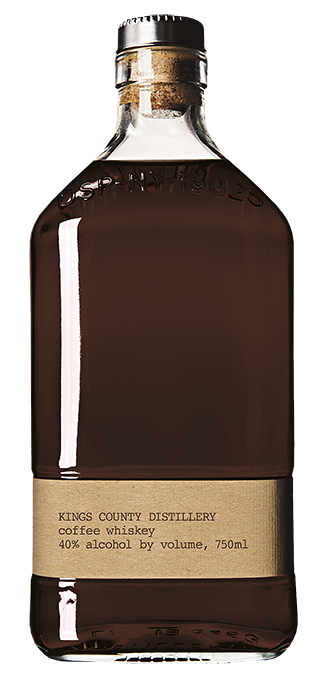 Similar to Aimsir, Kings County works with a local coffee shop, Parlor Coffee, to source cold brew, which is used to proof down unaged and aged whiskeys before a hint of sugar is added. “We needed a new, cocktail-oriented whiskey that could help us gain more traction in bars and restaurants,” explains Colin Spoelman, Kings County co-founder and distiller. “Coffee cocktails are really popular right now — look no further than the Espresso Martini, still New York City’s most on-trend beverage — and we liked the idea of making a coffee whiskey rather than a flavored vodka or overly sweet liqueur. It fills a gap that exists in the market, at least where most of our customers are located.” Kings County Coffee Whiskey is still new to the market, but Spoelman says early signs are positive. “It’s a really special spirit — people have even compared it to Madeira, which is a dense, not-too-sweet, complex fortified wine,” he adds. “It almost takes on a life of its own that’s suggested by but not necessarily defined by the coffee.”
Similar to Aimsir, Kings County works with a local coffee shop, Parlor Coffee, to source cold brew, which is used to proof down unaged and aged whiskeys before a hint of sugar is added. “We needed a new, cocktail-oriented whiskey that could help us gain more traction in bars and restaurants,” explains Colin Spoelman, Kings County co-founder and distiller. “Coffee cocktails are really popular right now — look no further than the Espresso Martini, still New York City’s most on-trend beverage — and we liked the idea of making a coffee whiskey rather than a flavored vodka or overly sweet liqueur. It fills a gap that exists in the market, at least where most of our customers are located.” Kings County Coffee Whiskey is still new to the market, but Spoelman says early signs are positive. “It’s a really special spirit — people have even compared it to Madeira, which is a dense, not-too-sweet, complex fortified wine,” he adds. “It almost takes on a life of its own that’s suggested by but not necessarily defined by the coffee.”
 MurLarkey Distilled Spirits has produced its Coffee Whiskey since 2017. In 2020, it earned a Best of Category award for Flavored Whiskey from the International Spirits Competition. “People appreciate good coffee and this extends to drinking quality flavored spirits, so this made coffee a natural fit for our line of infused whiskeys,” says head distiller Kevin Szady. “We take lightly ground dark Guatemalan roast coffee beans from a local coffee company, Haymarket Coffee Roasters, and steep it in a non-charred oak barrel of our 110-proof white corn whiskey for 36 hours. That’s it! We don’t add sugars, colors, flavors, or preservatives, so it’s all natural.”
MurLarkey Distilled Spirits has produced its Coffee Whiskey since 2017. In 2020, it earned a Best of Category award for Flavored Whiskey from the International Spirits Competition. “People appreciate good coffee and this extends to drinking quality flavored spirits, so this made coffee a natural fit for our line of infused whiskeys,” says head distiller Kevin Szady. “We take lightly ground dark Guatemalan roast coffee beans from a local coffee company, Haymarket Coffee Roasters, and steep it in a non-charred oak barrel of our 110-proof white corn whiskey for 36 hours. That’s it! We don’t add sugars, colors, flavors, or preservatives, so it’s all natural.”
Szady adds that consumer reception has been very positive. “People love the versatility of the coffee whiskey, whether it’s adding a shot to their favorite coffee, adding creamer directly to it, or making cocktails,” he says. Steve also notes the usefulness of coffee whiskey behind the bar. “When done well, a cold brew bourbon can be a staple of an inventive bar program for interesting spins on cocktails,” he says. “The flavors just blend well with vermouths, absinthe, Campari, and other typical bar tools. We also already know from things like the Espresso Martini and Irish Coffee that these flavors work really well together.”

